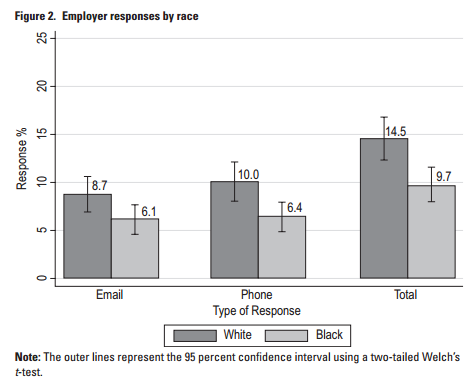Disentangling the effects of race and class on the social mobility of black Americans is one of sociology’s important jobs. A new study by S. Michael Gaddis is a nice contribution.
Gaddis sent resumes to 1,008 jobs in three parts of the United States. Some of these fictional job applicants carried degrees from an elite university: Stanford, Harvard, or Duke. Some had names that suggested a white applicant (e.g., Charlie or Erica) and others had names that suggested a black applicant (e.g., Lamar or Shanice).
Both phone and email inquiries from people with white-sounding names elicited a response more often than those from black-sounding names. Overall, white-sounding candidates were 1.5 times more likely than black-sounding candidates to get a response from an employer. The relationship held up when other variables were controlled for with logistic regression.

Gaddis goes on to show that when employers did respond to candidates with black-sounding names, it was for less prestigious jobs that pay less.
Comparing applicants who are black and white and have elite vs. more middle-of-the-road university degrees, blacks with elite degrees were only slightly more likely than whites with less impressive degrees to get a call back. As is typically found in studies like these, members of subordinated groups have to outperform the superordinated to see the same benefit.
This post originally appeared on Sociological Images, a Pacific Standard partner site, as “Elite University Degrees Do Not Protect Black People From Racism.”




